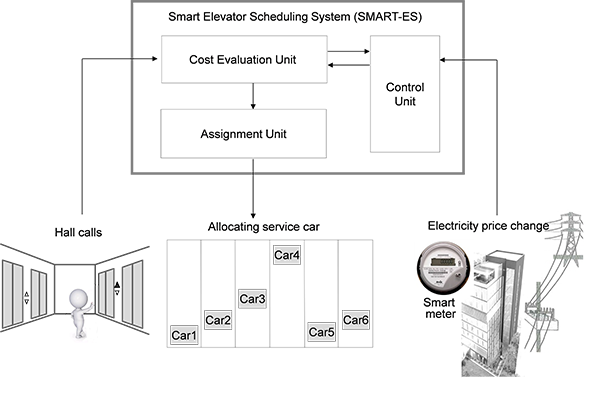본문
Energy-Efficient Vertical Transportation Considering Dynamic Changes of Electricity Price and User Traffic
by Prof. Hyokyung Bahn (bahn@ewha.ac.kr)
Department of Computer Science and Engineering
With the recent advances in energy-aware building technologies as well as the increasing dissemination of smart meters, the electricity usage of a smart building can be detected every moment and then transferred to the utility company. Thus, the utility company might adopt different price of electricity at each time slot of a day. In this research, we propose a novel elevator scheduling system that reacts to the dynamic changes of electricity price and passenger traffic. Instead of minimizing total energy consumption, our elevator scheduling system focuses on the minimization of total electricity charge, which was not the main focus of previous studies. In conjunction with this, we also consider the passengers’ waiting time.
In terms of the waiting time criterion, it is important to guarantee tolerable waiting time for each passenger. In general, passengers’ dissatisfaction grows as their waiting time increases, but there is a certain threshold that passengers are difficult to tolerate. That is, when a passenger’s waiting time is over this threshold, his/her dissatisfaction grows rapidly. Thus, our system is designed to keep the tolerable waiting time even though we need to pay more electricity charge. To do so, we adaptively control a tuning parameter. When the number of passengers becomes large (i.e., heavy traffic), the system adjusts the control parameter to increase the number of working elevator cars. This will eventually guarantee the tolerable waiting time of passengers. The control parameter returns to the initial value set by the manager when the elevator traffic lessens. In contrast, when the electricity price becomes high (i.e., peak time), the system adjusts the control parameter to reduce the number of working elevator cars. This will eventually save the electricity charge. However, adjusting the control parameter should be carefully designed to meet the tolerable waiting time of passengers. Thus, we use a genetic algorithm to satisfy the two conflicting goals.
The contributions made in this research can be summarized as follows.
First, we take into account the electricity price changes during a day in group elevator scheduling. As the electricity price changes dramatically in modern smart grid environments, the scheduling system should consider the actual cost of the electricity price rather than just the total energy consumption.
Secondly, although we consider both the passengers’ waiting time and the electricity price, we model and solve the problem with a single objective genetic algorithm with a constraint instead of multi-objective optimization techniques. That is, we observe that the scheduling problem that we consider need not be solved by complex multi-objective genetic algorithms, which are difficult to be applied in on-line scheduling systems as they need much time to converge but the scheduling should be performed instantly. We model it as a minimization problem of the electricity charge with a constraint that the waiting time is below a certain threshold. This is reasonable as guaranteeing the tolerable waiting time is more important than minimizing every passenger’s waiting time as passengers are difficult to tolerate when their waiting time exceeds a certain threshold but can accept it if the waiting time is less than the threshold. This also allows the quick convergence of the genetic algorithm, leading to reasonable computation overhead.

Fig 1. Architecture of the proposed system
* Related Article
Sungyong Ahn, Soyoon Lee and Hyokyung Bahn, A Smart Elevator Scheduler that Considers Dynamic Changes of Energy Cost and User Traffic, Integrated Computer-Aided Engineering, 2017.03, vol. 24, no. 2, pp. 187-202.













